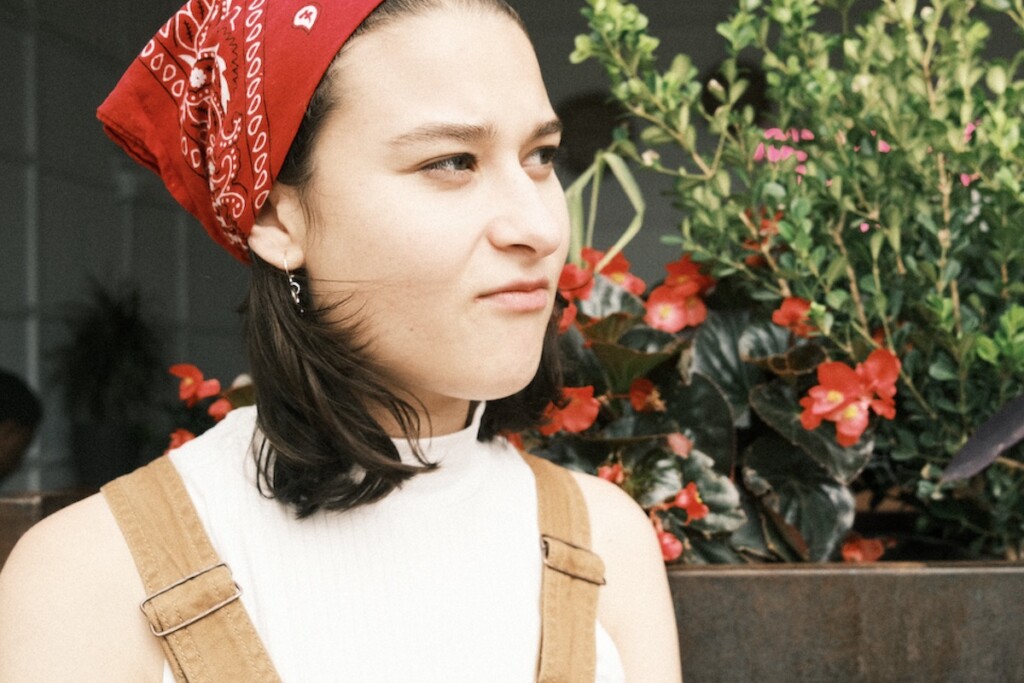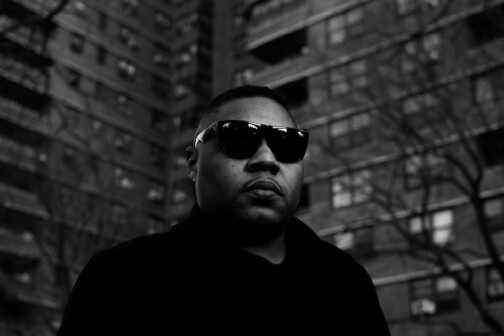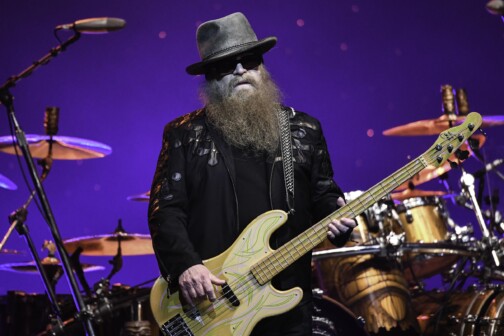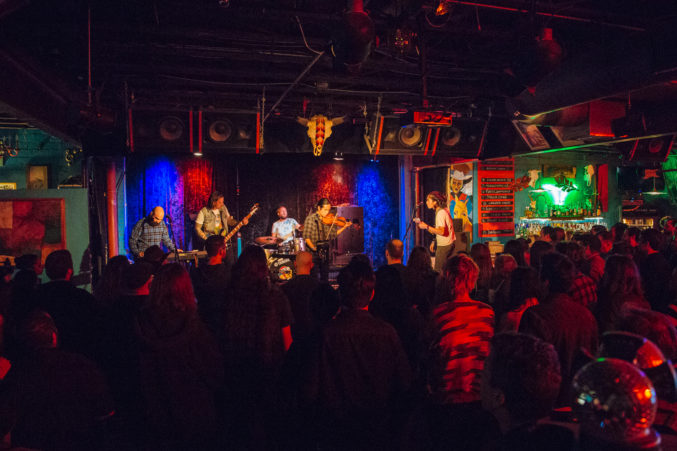It’s been five years since 23-year-old singer-songwriter Ceci Callejas left her home in Nicaragua to attend college in San Antonio. Out of boredom, she bought a guitar to pass the time and started playing songs for her friends. Their feedback quickly made her realize how far her talent could take her.
She moved to Denton, an eccentric city known for punk rock, noise, and house shows, to pursue music and build her artistry. With a piece of paper and a Sharpie, she made a simple flyer looking for a producer and posted them around bookstores and coffee shops, a common approach taken by many college students and aspiring musicians. It worked.
In 2020, Callejas, now professionally known as Ceci Ceci, released her first track “Enciclopedias,” a tribute to her late father and her most-streamed song on Spotify. The next year she released her three-track EP “Fruta Tropical,” which she calls an “ode to Latin American music” with a twist of Son Cubano and ska. Her lyrics speak of her experience as a migrant, her hometown in Nicaragua, and her culture. Her words will soon touch on her queer identity.
Callejas says her music career has been ascending quickly thanks to connections in Dallas-Fort Worth. She played her very first show in Dallas at indie artist Alex O’aiza’s music video release show—she DM’ed him—and was added to Chasquis Group’s talent roster.
Before her show at Tulips FTW on Aug. 13, we spoke to Callejas about navigating the DFW music scene and her personal developments. Here’s what she said, Plus, as always, a playlist of 10 Spanish tracks she loves.
Who the heck are you?
That’s a good question. Who the heck am I? I am an ever-changing human being that struggles like everybody but happens to make music for fun.
I was a very musical child when I was little. I remember being really into this Argentinian soap opera called “Floricienta.” I knew all the soundtracks to the telenovela. I remember singing in my room and pretending there was an audience. Professionally, [my music career] started my sophomore year of college when I released my single. It took me a while because pursuing music is something scary, I think. Coming from a very conservative Latino background, it’s not that [there are] expectations of what you should do – I’m not saying that my family didn’t support it —but it was just scary. It’s scary to put your music out there and do something that might fail. Since 2020, I’ve been releasing music and it’s been great, honestly.
The North Texas Daily, UNT’s student newspaper, just wrote an article about you, your upbringing in Denton, and working with Nathan Clark of Dust Mothers. How was navigating Denton, a town that’s mostly known for punk and noise music, as a Spanish-singing Latinx musician?
Yeah, Nathan Clark is my producer. I moved from Nicaragua in 2017 to [Texas] for school, but I had no direction. I was like, ‘I just going to come to the U.S. for school, and let’s see what happens.’ I was very bored because I didn’t know a lot of people here. I moved here not knowing a soul. So, I bought a guitar. I started playing to myself and then to my roommates and to my friends.
I was like, ‘I think there’s something. I kind of like this.’ People would react in a way that would be like, ‘I think they’re not bullshitting me. I think they genuinely like it.’ I was in San Antonio, and I didn’t know the music scene very well and I was very young. The school I went to wasn’t very artsy. My brother went to UNT and when I started talking about making music, he was like, ‘Come to Denton, Denton is very artsy, you will meet people.’ I was like, ‘I don’t think so.’ Well, he convinced me. I moved to Denton not knowing a soul, but I was like ‘I’m going to find a producer, and everything will start from there.’
I grabbed a white piece of paper and with Sharpie, I wrote, ‘Who wants to be my producer?’ and my phone number – very shady. One of the people that reached out was Nathan and he was like, ‘Saw your flyer, send me your music, let’s work together.’ It turned out to be the best. We’re like a dynamic duo. Him being American, he’s super open and acquainted with Latin sounds because he’s really into Portuguese music. He was super open and flexible to work with me and he has been part of 90 percent of my music that’s out.
Becoming a musician is pretty life-changing but moving from Nicaragua to Texas is a huge transition.
Man, it was so hard. Moving countries is traumatic. Culture shock – everything. I moved and it was tough. Thankfully, I moved with a friend from Nicaragua, so there was a cushion, but it was still hard. As a person who was looking for their path. As a queer person that was starting to accept herself. Coming from a very conservative background, coming to the States was a huge factor in my development, both musically and personally. I think if I wouldn’t have come to the U.S., I wouldn’t have the evolution that I have been able to have here. I love my country, I love it with a passion, but it’s very conservative and the opportunities for the arts are very limited. That’s something I wish will change in the future. Maybe I could contribute to that, but I thank the States for a lot, for sure.
You have a song called “Migrante” based on your experience coming to the U.S. Could you tell us about its significance?
I haven’t been home in five years. It’s been a combination of political turmoil back home and my immediate family moving entirely to the U.S. I remember longing for home. Yes, I created my life here but my roots, my values, my core were created in Nicaragua. [There are] a lot of people that, because of the political turmoil, fled to the U.S. I knew there was a sentiment of longing, not only for me but from a community of Nicaraguans that were exiled. From that sentiment, I wrote “Migrante” about missing home and being a migrant. The chorus goes ‘Even though I’m not with you/I’ll promise I’ll go visit you/But in the meantime I’m migrating.’ It resonated with Nicaraguans, like, you have no idea. It’s one of my most listened-to songs on Spotify. Even if people are not from Nicaragua. It’s a universal feeling, that longing feeling because the U.S. is mostly migrants.
What inspires your sound?
At the beginning of my songwriting career, it was very personal. It was me in my dorm room singing to myself about girls when I hadn’t come out. It was very intimate, very secretive. As I started evolving as an artist and sharing my music, it shifted from ‘This is mine, mine, mine’ to ‘What is something I can give to people that they will dance or enjoy?’ Now that’s my focus. That’s what inspires my sound. I’m thinking, ‘What will make heads bounce? What is fun and makes you just disconnect from everything?’ Something fresh, something fun. I still have glimpses of that very intimate songwriting approach, so I like to dance between the two.
Do you feel like you fit in Dallas as an artist? Have you found it hard to find opportunities being a Spanish-singing Latinx musician or has the community welcomed you?
You know what, I’ve been very lucky that Denton, for example, was very welcoming. My music is nothing like that you hear at Killer’s Tacos on a Friday night. You don’t hear “Fruta Tropical.” Usually, it’s more punk rock and stuff like that. I’m very grateful that people find a charm in my music. It has opened doors more than it has closed. I think people have a thirst for what’s different and Gen Z, our generation, has a thirst for what’s different and unique. There’s diversity.
Now that I moved to Dallas and did my Instagram spamming and messaging all these people, it’s been hard work but when they listen to what I have to offer, I think the wheels start turning. I don’t know what’s going to happen in the next few months, but I’m thrilled because I think it’s only going to be up from there.
There’s an immense amount of diversity here. This generation just happens to be very creative and artsy, that’s why we’re seeing it now.
What are your plans for new music?
Now that I have a band, most of my setlist is unreleased stuff, so I plan on releasing that stuff by the end of the year. So, people can’t go to my shows and be like ‘What song was that? Oh, it’s not on Spotify” because I get that a lot. I want to be able to go like, ‘oh, you can go listen to it,’ and have my entire setlist published. That’s the goal for now.
I have a song I’m going to record called “Julieta” and it’s my first song directed to a girl that I’m ever going to release, my first, ‘I’m queer and I’m talking about it.’ I’m very excited about that because it’s huge. Music is helping me embrace every part of me and I’m excited.
I’m currently working on a song called “Spanglish,” with two very talented Dallas-based musicians, Sordelo and Youforia and planning on releasing that in August. The song is about my last breakup, real tough one. I decided to put those feelings into song, and that’s how Spanglish was born. Also, it’s a ‘lil tribute to all those Spanglish speakers.






